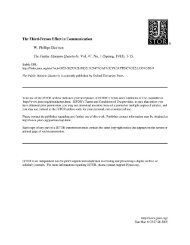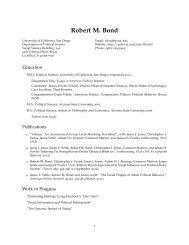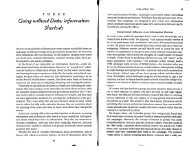Chapter 6 Why Authoritarian Parties? The Regime Party as an ...
Chapter 6 Why Authoritarian Parties? The Regime Party as an ...
Chapter 6 Why Authoritarian Parties? The Regime Party as an ...
You also want an ePaper? Increase the reach of your titles
YUMPU automatically turns print PDFs into web optimized ePapers that Google loves.
to counter opposition to the exercise of widespread political control.<br />
CHAPTER 6<br />
When I juxtapose cooptation via a regime-s<strong>an</strong>ctioned political party <strong>an</strong>d repression, I<br />
find that dictatorships coopt most effectively when they aim at ideologically most proximate<br />
segments of the population rather th<strong>an</strong> actual opposition. Because the cost of cooptation<br />
is more sensitive th<strong>an</strong> the cost of repression to the ideological dist<strong>an</strong>ce between a member<br />
of the population <strong>an</strong>d the regime, the regime spends scarce resources most effectively when<br />
it recruits those who are ideologically closer to it. This finding is consistent with historical<br />
<strong>an</strong>d qualitative research on the selective nature of party recruitment <strong>an</strong>d promotion policies<br />
<strong>an</strong>d suggests a qualification to the frequent claim that parties serve to coopt opposition. 3<br />
<strong>The</strong> present <strong>an</strong>alysis implies that the logic of party-b<strong>as</strong>ed, selective cooptation is to enlist<br />
those segments of the population that will best help marginalize actual opposition rather<br />
th<strong>an</strong> coopt it. 4<br />
This chapter’s findings about the contribution of regime-s<strong>an</strong>ctioned parties to authori-<br />
tari<strong>an</strong> resilience also suggest <strong>an</strong> amendment to Bueno de Mesquita et al.’s (2003) influential<br />
selectorate theory. At the heart of selectorate theory is the claim that potential defectors<br />
from<strong>an</strong>incumbent regime must weighthe certainbenefits that theycurrently receive against<br />
the uncertain benefits that a challenger offers them. Bueno de Mesquita et al. (2003) <strong>as</strong>sume<br />
that such uncertainty results in <strong>an</strong> incumbency adv<strong>an</strong>tage that decre<strong>as</strong>es with the size of<br />
the incumbent’s coalition. <strong>The</strong> present arguments imply that dictatorships that coopt via a<br />
regime party with the org<strong>an</strong>izational features that I examine below survive under less favor-<br />
able circumst<strong>an</strong>ces <strong>an</strong>d in the face of stronger challengers th<strong>an</strong> those without such parties,<br />
3On party recruitment <strong>an</strong>d promotion policies, see e.g. Domínguez (1978, <strong>Chapter</strong> 8), Grzyma̷la-Busse<br />
(2002), Shambaugh (2009), <strong>an</strong>d Staar (1988).<br />
4C.f. Geddes (1999b, 135) <strong>an</strong>d G<strong>an</strong>dhi <strong>an</strong>d Przeworski (2007).<br />
7











